Collaboration with Nadiya Petrovska
Concrete, glass, plastic, acrylic, liquid.
Size: 12 x 13 x15 cm

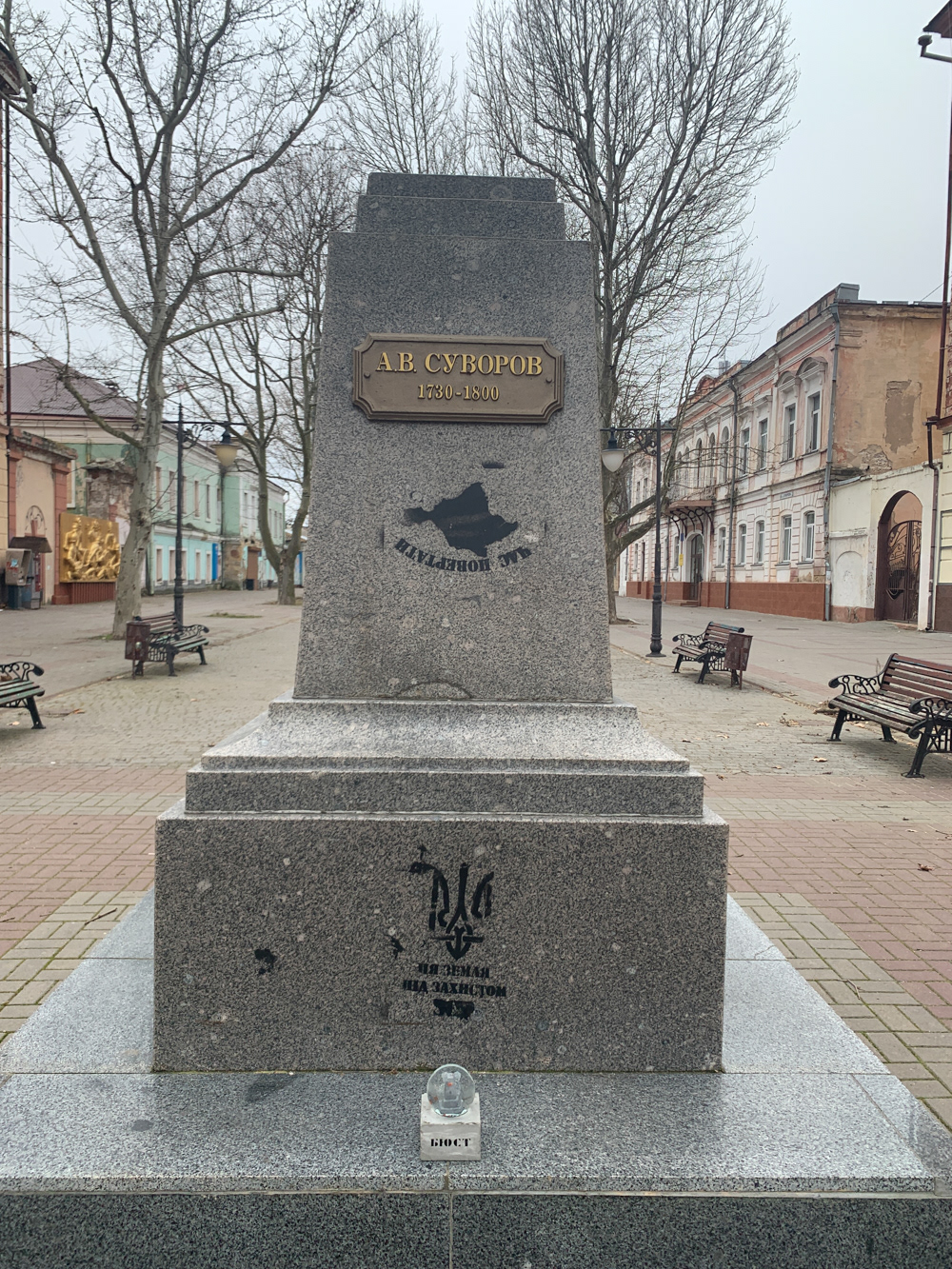
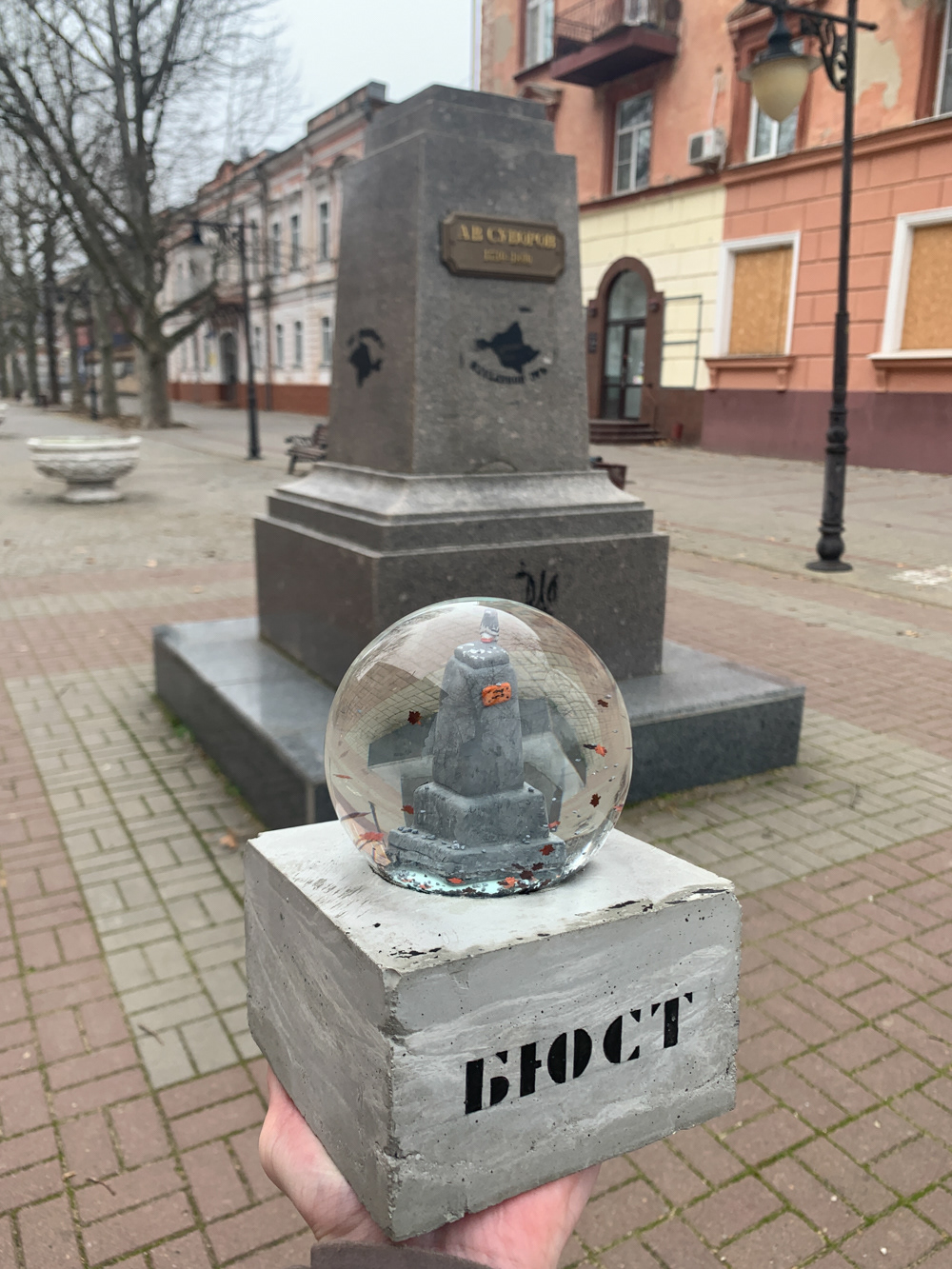
This is not a cemetery, but the central street of the city of Kherson. If I'm not mistaken, it's still called Suvorova Street. Not so long ago, a bust of a famous commander of the Russian Empire was installed on its pedestal. Kherson residents often arranged meetings there, saying, "Let's meet on Suvorov, near the head"—a good reference point that we, consciously or unconsciously, deprived of identity and value. We hesitated to get rid of it because it was "history," despite its irrelevance and rudimentariness.
So, in October 2022, when the retreating Russians announced the evacuation of everything they considered Russian (and materially valuable) to the left bank of the river, they actually did us a favor. They completed the decolonization of the city space, which we had not dared to do for a long time. Now, we must fill the created vacuum with something worthy. In our collective space, just as in our collective consciousness, emptiness has been walking for years. What was valuable has depreciated, and new values have not been acquired. Logos have filled the space where ideas should be.
Wandering thoughts and eyes often look for something in the usual place that will tell us what is worth living for, what is worth fighting for, why, from where, and where we are going. Eyes and thoughts are searching for a new identity, new meanings. This is definitely not a dead hero and not an iron woman who looks more like a man, no matter what sign she has on her shield. (Why not the BILLA logo?).
What are we looking for? Pain? Death? Victimhood? Strength? Power? Or maybe Life? Peace? Freedom? Love? Wisdom? Unity?
So, in October 2022, when the retreating Russians announced the evacuation of everything they considered Russian (and materially valuable) to the left bank of the river, they actually did us a favor. They completed the decolonization of the city space, which we had not dared to do for a long time. Now, we must fill the created vacuum with something worthy. In our collective space, just as in our collective consciousness, emptiness has been walking for years. What was valuable has depreciated, and new values have not been acquired. Logos have filled the space where ideas should be.
Wandering thoughts and eyes often look for something in the usual place that will tell us what is worth living for, what is worth fighting for, why, from where, and where we are going. Eyes and thoughts are searching for a new identity, new meanings. This is definitely not a dead hero and not an iron woman who looks more like a man, no matter what sign she has on her shield. (Why not the BILLA logo?).
What are we looking for? Pain? Death? Victimhood? Strength? Power? Or maybe Life? Peace? Freedom? Love? Wisdom? Unity?
Or perhaps Responsibility? At least for our personal choice from the proposed list.
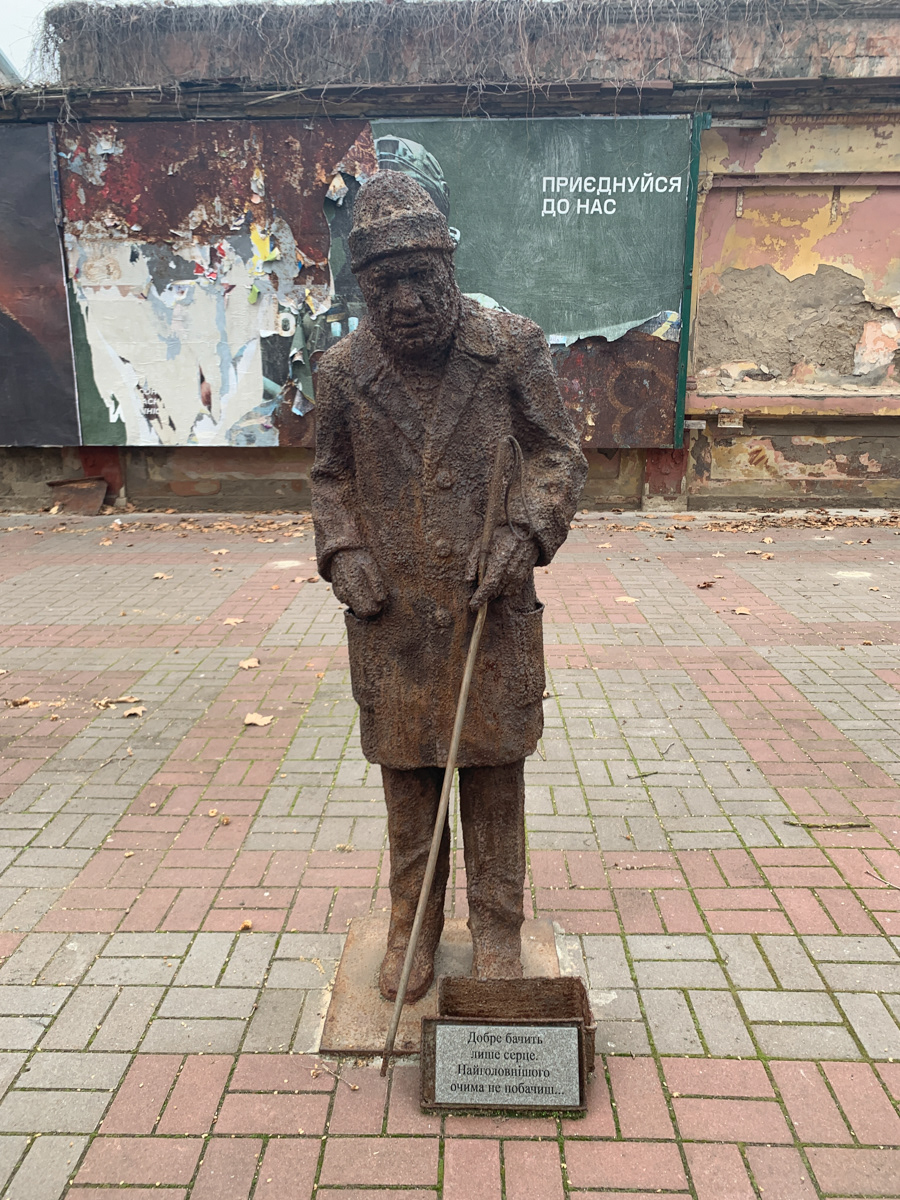
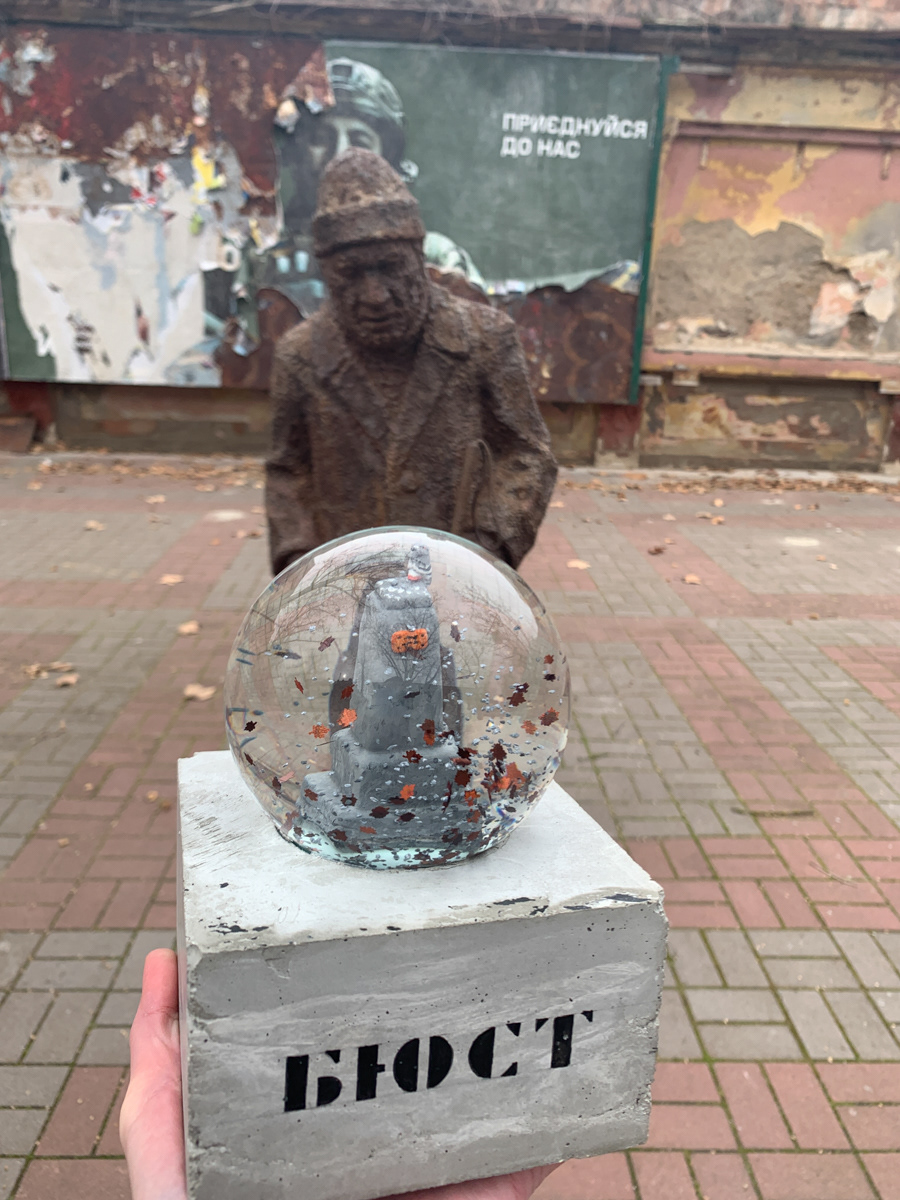
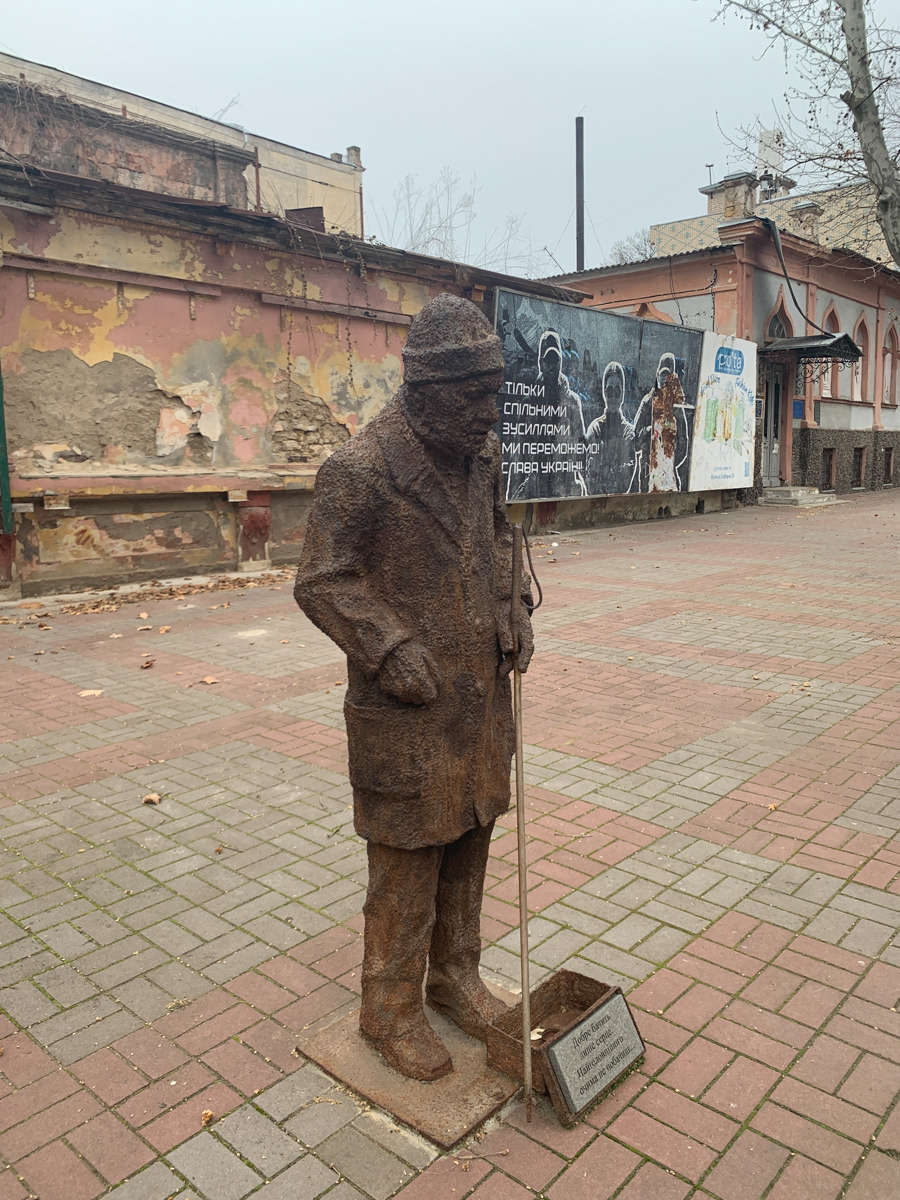
There is a continuation in the story about the abduction of monuments by the Russians. If you walk a little further along the central street of the city, you can meet Anatoliy Malyshevskyi. He has been standing here in the same place for many years—first as a living person, a blind singer, and now as a monument that reminds us about something important.
Anatoliy began to lose his sight as a small child. It happened after the careless contact of his face with the boot of an NKVD officer who had come to take his father away. If I'm not mistaken, by the age of twenty he could hardly see anything, but he managed to hide it and worked at a factory as a security guard. But sometime in the early 2000s, the day came when Anatoliy was fired. At first, he tried singing on trains until he dared to take his precise spot on the central street of the city.
The monument was paid for and erected by initiative residents at their own expense. The funds were raised on social media in the same way we are doing now to equip the Ukrainian Armed Forces. It was done not because he had a magical, special voice, but because, despite all his life's troubles—poverty, blindness, the death of his wife, and the debts of his son—he remained an optimistic and cheerful person. This is an ability we are lacking now. After all, to love life under any circumstances and to love yourself is, in fact, the same fundamental task. Perhaps the very true meaning of our existence, our way to paradise. Although, I am sure, there have always been enough people around who would advise him to balance his wheel and set his goals correctly.
Anatoliy kept the fire burning in our hearts with his voice and his presence. There, in the middle of the street, he might have been the richest man of all. On a plaque below, next to his money box, the words are engraved: "Only the heart sees well. You will not see the most important thing with your eyes..." I feel sorry that for many years I passed by Anatoliy without noticing him. I feel sorry that I was blind for a long time.
So, going back to the abduction story, the Russians took away what they consider important: the memory of the empire's generals, who probably valued people no more than livestock. Do they understand how this is connected with today's events—the war and "meat assaults"? Or with the latest trend of combat drone TikTok, where Russian soldiers on the battlefield put their guns in their mouths and pull the trigger? The question is rhetorical. Of course, they did not notice the most valuable monument in the city. But what about us? Where are the sandbags protection?
I believe it is worth thinking about why Anatoliy Malyshevskyi became the only Kherson resident who, since the independence of Ukraine, was honored with a monument in a public space. The self-taught artist Polina Raiko became the only Kherson resident who received her own museum during this time. A retired woman in a fairly similar life situation took up a paintbrush for the first time at the age of 69, spent her last money on cheap enamel, and painted her home's interior all over. The catalog of her works is called "The Way to Paradise." Unfortunately, her museum, which is located in the occupied territory, was seriously damaged by a flood caused by the destruction of the Kakhovska Dam by Russians last year.
Author of the sculpture: Yurik StepanyanSeries concept
The gift that no one would want to receive.
No one in their right mind would ever want this gift. Yet, fate and our nervous systems grant it to us, leaving us with no other choice. War is a profound trauma. While the conflict will eventually end, the triggers—certain objects, sounds, and places—will repeatedly pull us back into the raw feelings and states we once experienced. These memories settle at the bottom of our psyche like a heavy block of concrete, lying dormant as long as they are connected to intense negative emotions. We cannot move forward until we have reconsidered these events and understood how they have reshaped our personalities and values for the better. Only then can these memories be transformed into the foundational blocks of the person we are yet to become. Triggers cannot be escaped; they must be confronted and discharged so they are not inherited by our children.

